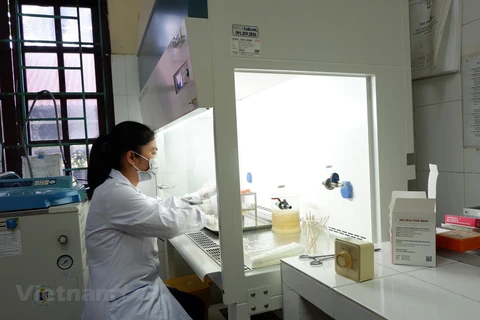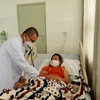 A doctor at the National Lung Hospital is giving check-up to a patient who is a student with tuberculosis (Photo: VietnamPlus)
A doctor at the National Lung Hospital is giving check-up to a patient who is a student with tuberculosis (Photo: VietnamPlus) Hanoi (VNA) – Vietnam still has a high rate of tuberculosis, ranking 11th among the top 30 countries globally with the highest rates of multidrug-resistant tuberculosis. It is estimated that each year in Vietnam, there are around 169,000 new cases of tuberculosis, 8,900 cases of multidrug-resistant tuberculosis, and roughly 14,200 deaths.
Notably, tuberculosis used to primarily affect older patients, but now this demographic is getting younger, particularly among students.
Doctor Nguyen Thu Thuy from the department said pulmonary tuberculosis is a disease that could spread rapidly and is hard to control. It root cause originates from the tuberculosis bacteria - with favourable conditions for it to develop into the disease.
Although tuberculosis could be prevented and treated, more than 4,100 people still die from it every day worldwide, and nearly 30,000 people contract the disease.
At the department, doctors are treating 6 pulmonary tuberculosis patients who are students or young adults. One typical case is a 20-year-old patient who manifested a chronic cough in early February 2023.
The patient took medication for some time, and the cough subsided, but it returned when the medication was stopped. More than 3 months later, the patient sought a medical check-up at the Hanoi Medical University Hospital where the lung-related condition was identified, leading to the patient being transferred to the National Lung Hospital for treatment.
 Doctor Nguyen Thu Thuy from the National Lung Hospital’s Tuberculosis and Respiratory Department (Photo: VietnamPlus)
Doctor Nguyen Thu Thuy from the National Lung Hospital’s Tuberculosis and Respiratory Department (Photo: VietnamPlus) Thuy said according to statistics, the highest tuberculosis incidence rate is in the working age group (around 41-50 years old), accounting for nearly 40%, with those aged 21-30 and 31-40 making up about 16% each.
At the National Lung Hospital, tuberculosis patients include children as young as a few months old to the oldest aged 90-95.
According to the doctor, there are two risk factors that could turn a tuberculosis infection into active tuberculosis disease: the quantity of bacteria and the body’s immune response. When there is a high quantity of bacteria and the immune system is unable to control it, the infection could progress to disease. Therefore, those at higher risk of developing tuberculosis due to weakened immune systems are often malnourished, heavy smokers, have chronic illnesses, experience immune suppression due to conditions like HIV, or are vulnerable children.
Additionally, if there is a source of active pulmonary tuberculosis in the family, it could also be a factor in transmitting the disease to children.
For students and young adults, the stress of studying without proper rest and relaxation could also contribute to weakened immune system. When the immune system is compromised, the risk increases of transitioning from a tuberculosis infection to active tuberculosis disease.
Living and working in environments that do not provide adequate ventilation or involve close proximity to a large number of people in confined spaces with high humidity and low airflow could make it easier for the growth and transmission of tuberculosis bacteria.
Doctor Thuy said young people with good health and strong immune system often overlook the initial symptoms of the disease. However, tuberculosis is a silent and slowly progressing disease, often detected late. If not treated promptly and effectively, it could lead to severe complications that threaten one's life.
Tuberculosis is one of the leading causes of death among infectious diseases. To prevent tuberculosis, those who have been diagnosed with the disease should limit their contact with others and wear protective masks. Family members should also undergo screening to check for the disease.
For those who haven't contracted tuberculosis, it is essential to focus on a well-balanced diet, regular exercise to boost immunity, maintain good personal hygiene. It is also important to ensure proper ventilation in living spaces to minimise bacteria concentration (if present), and reduce contact with those exhibiting symptoms like coughing or sneezing. Children should receive tuberculosis vaccination within the first month after birth. Above all, regular health check-ups are crucial for early detection and timely treatment./.
























